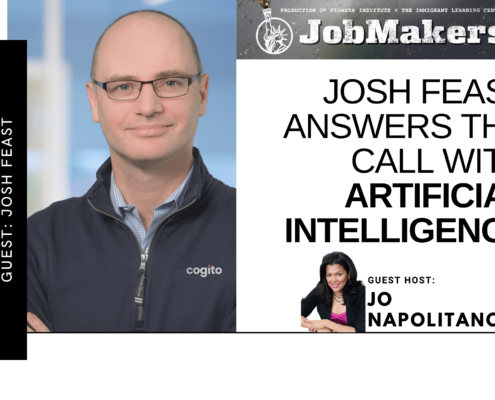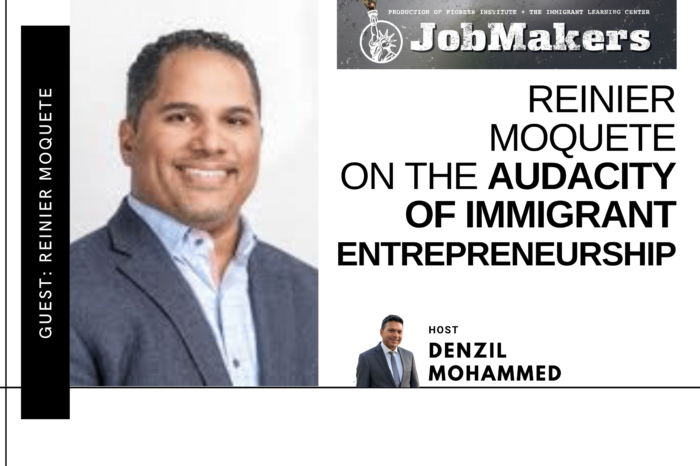Reinier Moquete on the Audacity of Immigrant Entrepreneurship
/in Economic Opportunity, Featured, JobMakers /by Editorial StaffThis week on JobMakers, host Denzil Mohammed talks with Reinier Moquete, son of immigrants from the Dominican Republic and founder of CyberWarrior, a cyber security services provider in Boston, Massachusetts. Reinier shares why he is continuing the entrepreneurial tradition started by his grandmother and mother, who moved to the U.S. in search of a better quality of life for their families. Reinier describes his efforts to give back to the country that gave his family a chance, through non-profits and foundations he has launched that elevate disadvantaged communities, expose children to STEM education, and uplift particularly Latinx people in the U.S., as you’ll learn in this week’s JobMakers.
Guest
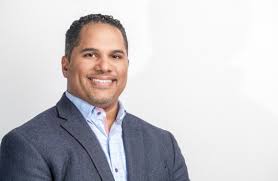 Reinier Moquete is a technology executive with over 20 years of experience. He is CEO of CyberWarrior.com, a Cybersecurity training and services provider. Reinier was appointed by Governor Patrick to the Massachusetts Governor’s STEM Advisory Council and by Governor Baker to the Commission for Digital Innovation and Lifelong Learning. Reinier is active in a number of philanthropic initiatives including being the Founder for Latino STEM Alliance, a non-profit that teaches over 500 kids a week to build robots; a committee member of the Latino Equity Fund at The Boston Foundation, the first permanent endowment focused on advancing the Latino community in Boston; and an advisor at Tech Hire Boston at the Boston Private Industry Council, an initiative to increase the tech talent pipeline coming out of Boston Public Schools. Recognitions include Emerging Leader by the Boston Business Journal; GK100: Boston’s 100 Most Influential People of Color; GK10: 10 Most Game Changing Equity Ideas; and PowerMeter 100: Massachusetts’ Most Influential People for Latinos.
Reinier Moquete is a technology executive with over 20 years of experience. He is CEO of CyberWarrior.com, a Cybersecurity training and services provider. Reinier was appointed by Governor Patrick to the Massachusetts Governor’s STEM Advisory Council and by Governor Baker to the Commission for Digital Innovation and Lifelong Learning. Reinier is active in a number of philanthropic initiatives including being the Founder for Latino STEM Alliance, a non-profit that teaches over 500 kids a week to build robots; a committee member of the Latino Equity Fund at The Boston Foundation, the first permanent endowment focused on advancing the Latino community in Boston; and an advisor at Tech Hire Boston at the Boston Private Industry Council, an initiative to increase the tech talent pipeline coming out of Boston Public Schools. Recognitions include Emerging Leader by the Boston Business Journal; GK100: Boston’s 100 Most Influential People of Color; GK10: 10 Most Game Changing Equity Ideas; and PowerMeter 100: Massachusetts’ Most Influential People for Latinos.
Get new episodes of JobMakers in your inbox!
Read a Transcript of This Episode
Please excuse typos.
Denzil Mohammed:
I’m Denzil Mohammed, and this is Jobmakers.
Denzil Mohammed:
What do apple McDonald’s Ford motors, state, farm insurance and home Depot all have in common. They were all founded by the children of immigrants. The children of immigrants have a high propensity to be as entrepreneurial as their parents. And the United States has benefited from generations of immigrants like this for Reinier Moquete, son of immigrants from the Dominican Republic and founder of CyberWarrior, a cybersecurity company in Boston, Massachusetts. He is continuing the entrepreneurial tradition started by his grandmother and mother who moved to the us in search of better life for their families. In fact, he says it’s love of family, that prompts immigrants to do what it takes to be successful in their new Homeland, including starting a business Rainier has gone further. However, it has given back to the country that gave his family a chance he’s launched nonprofits and foundations that seek to elevate disadvantaged communities, expose children to science, technology, engineering, and math, or stem and uplift, particularly Latinx people in the US, bringing them to the forefront of technology and leadership. As you learn in this week’s Jobmakers. Founder and CEO of CyberWarrior, Reinier Moquete, welcome to JobMakers. How are you?
Reinier Moquete:
Well, thank you for having me.
Denzil Mohammed:
So tell us a little bit about your company, the 30-second pitch.
Reinier Moquete:
CyberWarrior is a,very unique company. We train people to be cyber security engineers and we put ’em to work. And so we’ve developed a, a methodology that includes an online learning platform with a 800 hour bootcamp. Live online. People are essentially exposed to the cybersecurity industry all the way from the basics of computer science. And we graduate them as well, qualified security engineers, and then we help them get ’em a job.
Denzil Mohammed:
That’s pretty incredible. And, and as I was talking with you earlier about out the statistics around unemployment rates for cybersecurity this means your company is really important, not just now, but in the going forward in the future, right?
Reinier Moquete:
Yeah. I mean, the, the reality is that cybersecurity has become a national security issue. It’s not only about ensuring that people are just entering the industry, but that our water supplier food supplier energy supply is protected. You know, today’s conversation is particularly timely with all the company across the world. And the reality is that when we think about protecting our country, there’s gonna be a cyber attack before any missile ever gets launched. And that’s just the way we live. Beyond that cybersecurity has become a tremendous economic development opportunity. And you have a situation where there are 4 million open jobs, globally, 600,000 open jobs in the us alone. It’s a very unique opportunity for underserved communities to come into the industry and to grow and PO prosper. And, you know, it’s, it’s pretty exciting and it’s pretty rewarding when you have someone who is maybe works in a kitchen or someone who comes from a totally non-technical background without any college education at all. And they’re able to go through our program and walk out with an 80 or $90,000 a year job, and only six months to pretty amazing.
Denzil Mohammed:
That is pretty incredible. And the numbers you shared, 600,000 open jobs in the US. It’s kinda crazy. I want to get into your journey into entrepreneurship. Did you always want to be your own boss? Does it run in your family? You know, tell us, tell us how you ended up there.
Reinier Moquete:
When I was s a kid, the first entrepreneurial experience was a video game for my friends. They had this little video game when I was like seven or eight. And I used to let kids in the neighborhood play for, for 25 cents in the Dominican Republic. And so that was my first entrepreneurial experience, nine years old, I had another business where I was making bracelets and selling those in school. I used to go to the market to buy leather and cut it up. And, I guess I’ve always been an entrepreneur to one degree or another, and I always knew that it’s a passion that I wanted to pursue.
Denzil Mohammed:
And what’s what qualities and skills do you think you had to draw on the most in order to launch your own business?
Reinier Moquete:
Well, I think that the key thing to be an entrepreneur is tenacity and perseverance.
Reinier Moquete:
Entrepreneurship is hard. There’s this very misconception that people go into entrepreneurship because they want to work less. And it’s actually exactly the opposite. Actually you have to be a little bit crazy for you to want to go into business. Most businesses fail. Most people put their life savings into these businesses and it takes years before you get that money back. So you have to really be committed for the long term. For me, it was tenacity and perseverance and a conviction that I’d rather play and lose than not play at all. In terms of hard skills. My entire career has, has been the tech sector. And so I brought that into my, as a business owner, but the reality is that, you know, most of what I know today, I learned after I decided and I had to, you know, figure out how the parachute works after I was already in the air. And, you know, to a large degree, I find myself flat on the ground with my face dusted and bloody and all that. And again, the perseverance comes in cause you just have to get back up.
Denzil Mohammed:
I’ve never heard that analogy before about skydiving, but it is you’re taking a risk. You’re literally jumping into the unknown in a sense. And I would venture to suggest that perhaps this is something that was in your genes because, you know, I like to say that the act of migrating is an entrepreneurial act. You take a risk, you leave everything, you know, behind. You’re not sure if the, if the outcome is gonna be successful or not, but you do it anyway. And your grandmother took that risk by leaving the Dominican Republic, and coming to the US. Is that right?
Reinier Moquete:
Absolutely. And, and many of my family members as well my mom as well, who was a medical student in the Republic and only needed her theses to finish. But yes, she decided that was here where, where she was gonna be better off where her kids were. And I think it’s a story of many of the immigrants that you see in the US today. In fact, most of us both either as direct immigrants or kids of immigrants that we see that desire, that audacity to succeed above all costs and the willingness to pay a very heavy price of leaving family behind in order for you to pursue that desire to do something different in order to provide for your family back home. Right? It, it, it really takes a lot of courage. And I think in many ways, the, the story of America, the story of a entrepreneurs and the study of the story of immigrants are one in the same.
Denzil Mohammed:
It’s funny that you say that because it, from time, the time immigrants started to people started to move here, whether they call themselves immigrants or not, they, they started businesses Levi Straus up until Elon Musk today. It’s this, it is a story of immigration and the story of America reflect a little bit on that move of your grandmother and your mother and, and the other people you knew who moved from the Dominican Republic. What do you think? What kind of qualities do you think it reflected on their part to take that risk?
Reinier Moquete:
I think one of the key things that it requires is the love of family, it is rare that you don’t see an immigrant who doesn’t send money back home. And even those of us that maybe this generation of Americans, we might have been born here. We still have that sense of commitment towards other family members who perhaps are not as stable financially. And so you have that sense of unity. And I think that that’s the key driver for most immigrants. I think that beyond that, again, it’s that burning desire of pursuing a passion. And, you know, you mentioned, you know, great entrepreneurs like Elon Musk, it’s really that tenacity that says, well, I’m not gonna be able to achieve whatever it is that I want to achieve within, you know, my local community. And so I’m gonna go out and I’m gonna venture and I’m gonna pursue whatever it is I wanna pursue at all costs. And I think that that’s the thing that’s made America so successful when you have all these people have that same, that same audacity, that desire to, to move forward.
Denzil Mohammed:
I love the way you frame that in terms of love of family. And the story of many immigrant families is can be very, very chopped up. You know, one parent moves first, they’re separate from their kids. And for years, they try to establish themselves. They send for one kid, two kids the rest of the family comes up. It might take 10, 20 years for that to happen. And people often wonder, you know, why would families split up like this? But sometimes that’s the only way of often more. Oftentimes they’re not. And you use the word audacity, which I find fascinating. I don’t think anyone, one else has used that word on this podcast to describe it is audacious. So them to think that they can do this and that it might actually work. What is your company, CyberWarrior like? What is it ultimately empower individuals to do what career and business opportunities are available for them after they, for instance, take your bootcamp,
Reinier Moquete:
We’re training cybersecurity engineers. We are taking them into the doorway of an industry that is growing by leaps and bounds. Everything in our world today is dependent upon technology. Even if it’s a glass of water, glass of water and won’t not reach your lips unless touched by technology in some way shape or form, look at the way we’re communicating today. Look at the way the world has changed with our pandemic, right? So cybersecurity is the knitting that keeps all this technology working properly. Otherwise people would take it apart and use it for nefarious things. So we put people at the doorway of this industry, and they’re able to not only pursue careers as engineers, but they’re also able to pursue careers as auditors, and they’re able to pursue careers in sales. The fact that you’re able to sell technology, the fact that you’re able to sell software, the fact that you’re able to sell consulting services, but in such a fast growing industry, all these things are extremely lucrative. And so if there’s one thing that we’re providing, it’s it’s opportunity, it’s an opportunity people to gain access to economic freedom.
Denzil Mohammed:
I start a job for the future, the job of now, but all of this goes back to whether or not enough people choose to focus their studies on stem. You are part of several initiatives in Massachusetts. Some of which you’ve founded yourself like the, let Latinos in stem and the cyber warrior foundation, as well as tech hire Boston that encourages young people to get into the stem fields in a very, very hands on way. So tell us about, at least one of them, let’s say the cyber warrior foundation, what’s the main message you wanna get out to parents and kids?
Reinier Moquete:
Well, what CyberWarrior Foundation, what we aim to do is to engage you early in their lives into the world of cybersecurity. Cybersecurity is a career that you’ll never be bored. Why? Because you’re learning something new every single day. And it also has this mystery to it. You, you it’s been romanticized in movies with the hackers and this and that. You, the reality is that the things you see on TV are so a large degree are very real. Those are the risks associated with security breach. And at the same time, it also provides not only a very fun career path, but one that allows kids to use a lot of the, of things that they enjoy. And let’s say gaming, we use those concepts in real lives. So I would say that for parents thinking about opportunities for their children, here’s something that would allow them to say and have fun with while also making a good living.
Denzil Mohammed:
Let’s put an intersectional lens on this, because you’re also a part of the Latino equity fund out of the Boston Foundation. And a lot of the work you do with young people is to get families that are in disadvantaged communities or groups that are probably traditionally not occupiers of the STEM field to enter the STEM field. So why is that part of it important to you? And is it, does it have anything to do with the fact that you’re from the DR, you know, your heritage is based in the US and the DR.
Reinier Moquete:
Yeah, I mean, as a, as an AF Latino I’m certainly committed to creating equity and opportunity, and, and that’s why I decided to participate in the Latino equity fund. The Latino equity fund is the first and only Latino focused fund in Massachusetts. It was funded and seated by The Boston Foundation and Hispanics and philanthropy. It’s a, it’s a very unique partnership of Latino philanthropists and business leaders who essentially came together to say, Hey, we, we need to find some solutions and we need to elevate this message, right? So the, the focus has been on raising money. And over the last few years $700,000 in grants have been given out to Latino lead and Latino serving organization going into the next three years. There’s a focus on raising $10 million in order to strengthen the economic opportunities that are available to Latinos.
Denzil Mohammed:
Have you already seen success with this, even if it’s small successes?
Reinier Moquete:
Absolutely. We not only have been able to support communities within the COVID pandemic, but even before COVID, we’ve been making key investments in early childhood education, health equity, workforce development. And so over the last five-six years, where we’ve been operating, we have been very deliberate in identifying the communities that need the most help, and then engaging subject matter experts from within those communities to ensure that whatever investments we’re making are targeted towards those that need it most and where we’re gonna see the most time. And so there’s a number of stories that we’ve seen of families that have been brought out of poverty, as well as you know, for example, in, in, in certain communities here in Massachusetts such as Chelsea, for example, has, you know, vaccination rates of 98, 99%. And those are the type of things where we look to invest in.
Denzil Mohammed:
Oh, wow. That’s an incredible statistic about Chelsea. Finally just bring it into the present day, given the legacy of your family. If you had to give America a message about the value of immigrant entrepreneurship to the us, you know, your train people, you’re not training immigrants, you’re training everybody to protect the, the us to protect all the us assets. What, given how routed immigration is in, in politics and controversy, what would you say to America about the value of immigrant entrepreneurship to us?
Reinier Moquete:
Yeah, I mean, I believe there was Nelson Mandela that said, everything’s impossible until somebody does it right, and that same desire to impossible, to create opportunities for their families to create opportunities for themselves are things that are the bedrock of entrepreneurship are the bedrock of capitalism. We’re the people that are creating jobs. We’re the ones that are risking it all for the things that we believe in. And that is what has allowed us as a country to prosper and move forward. The country of immigrants. We always have them. And it’s that again, audacity that desire to move forward that allows us as a country to be,
Denzil Mohammed:
That is a terrific message that succinctly sums up everything we try to say in this podcast. Reinier Moquete, CEO and founder of CyberWarrior, thank you for joining us on the JobMakers podcast.
Denzil Mohammed:
JobMakers is a weekly podcast about immigrant entrepreneurship and contribution produced by Pioneer Institute, a think tank in Boston and at the Immigrant Learning Center in Malden, Massachusetts, a not-for-profit that gives immigrants a voice. Thanks for joining us for this week’s incredible story of entrepreneurship. This time from the child of immigrants. Next week, we’ll be joined by Theresa Park, deputy director and senior executive vice president of Mass Development, on how immigrant entrepreneurs are revitalizing cities like Lowell, Lawrence, Worcester, and more. I’m Denzil Mohammed. See you next Thursday at noon on JobMakers.
Related Posts
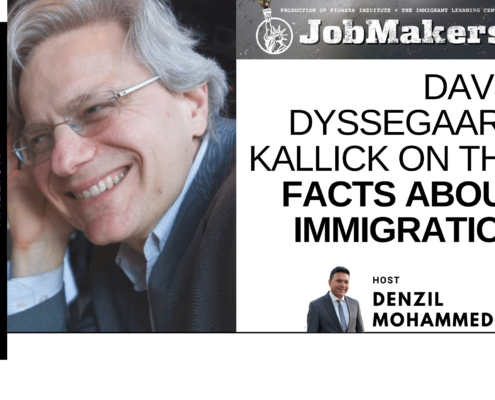
David Dyssegaard Kallick on the Facts about Immigration

Ely Kaplansky Goes from Immigrant to Inc. 5000 Insurance Entrepreneur
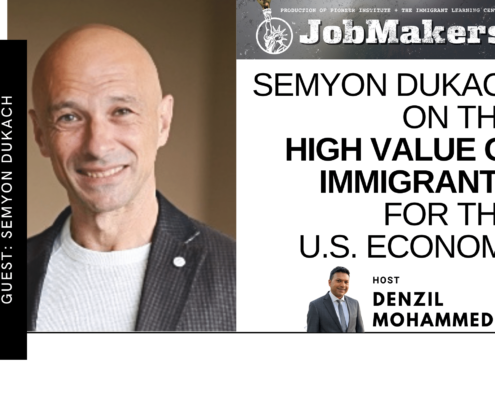
Semyon Dukach on the High Value of Immigrants for the U.S. Economy
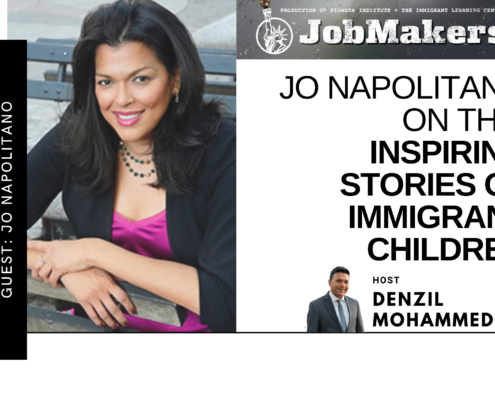
Jo Napolitano on the Inspiring Stories of Immigrant Children

Umesh Bhuju Seeks a Fair Deal for Immigrants, Farmers & the Environment

Dr. Babak Movassaghi on Winning in Football & Healthcare Innovation

Jitka Borowick on Starting a Small Business during COVID
